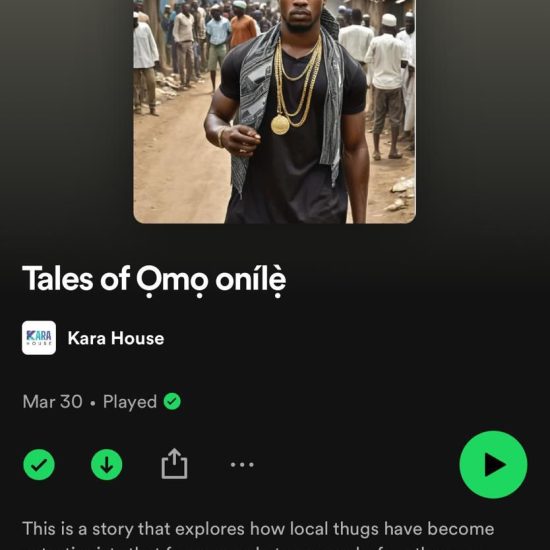Narrator: Tales of ‘Omo Onile’ are not new. If you’ve tried to construct a building in any state capital in Southwest Nigeria, this could easily be your story.
Sakirat Kajogbola: Won ni ama San N50,000 ka to le beere ise, emi de ti losan N30 thousand fun won, leyin N30,000 yen ni won wa tun disturb, eyin igba ye won tun wa gba N10 thousand si leyin igba ti won se awon yen lese. Owa je N40 thousand, eyin gba ye won wa to fi wa sile lati ma ba se lo.
Interpretation: They said we will start paying N50,000 before we could start work. I paid N30, 000 which I could afford, so they came to disturb us because we didn’t balance, and they came around again to collect another N10,000 after causing havoc. That is N40, 000 and they still came around to collect me even after the incident.
Narrator: If you have ever worked on a construction site, you may have heard this story. It may have even happened to you.
Kareem Abass: Won na wa gaan, nibi ti emi tun ti fe sa lo, ikan tun tele mi, won tun bo mi mo be, eni ti ko tun mo ikan kan ti o kan koja lo ni ti e, won tun se le se po mo won.
Interpretation:
They chased everyone, even those going on their own. We were beaten and macheted, I tried to even escape but one of them followed me and they all jumped on me. I was the only one who escaped because I saw them. They even chased me into the bush.
Narrator: FROM KARA HOUSE Media, this is Omo Onile.
You will see them at construction sites. A well-dressed male leads a gang of men and boys wearing sagging trousers and bearing weapons. Sometimes, you will see just the mob. You can always tell them by their unstained hands, no coveralls, no sweat. In Southwest Nigeria, we call them Omo Onile. The phrase is a Yoruba coinage loosely translated to the owners of the land. They are saying we are the landlords here, and you can’t have a home on this plot unless you make us happy. They are touts who are ready to kill and maim to get what they want
Narrator: Popoola Ademola went to Osogbo, the Osun state capital, a province in south west Nigeria at her shop Sakirat Kajogbola, a divorced mum. Sakirat has two kids. For five years, she has been selling pastries from her store at Oke Baale in Osogbo. Sakirat bought half a plot of land to build a house she and her children could call home after saving enough money from her business.
Sakirat: Mo n ta ja, mo ta provisions, ko si ara ti mo le fi flour da, puff puff ni, bons, meat pie, egg roll, chinchin, peanut. Ni gba ti a de lo si school ti a o si rise, and ko si pe ona kan leyan fi n je eyan laye, school of health de ni mo ti pari.
Sakirat: Ikan to sele ni wipe, gege bi obirin pelu age mi yi, though mo ni marital problem ni time yen, mo wa wo wipe ti eyan ati oko ba ti e ni misunderstanding, ko ki sepe next thing ni ki eyan ma wa influence ara re si nkan ti ko se, mo need lati move on pelu life mi ati awon omo mi.
Narrator: According to Sakirat, It was important for her to find a honest source of livelihood after the divorce, one that didn’t leave her at the mercy of anyone and gave her children the support they needed)
Narrator: To raise money for the land she bought, she joined a cooperative with other traders. Every month, each person dropped a certain amount of money. All of that fund is given to one person on a rotational basis. This style of raising money is referred to as “ajo,” a Yoruba lingua for “together”.
Sakirat: Mo ni lati lo ma dajo, ajo yi infact mo da fun odun kan, N20, N20 thousand, igba ti mo wa ripe owo yen ti se mo wa lo ra ile half a plot.
Narrator: This is Sakirat telling me how she contributed N20,000 every month for about a year before she could purchase the land – this should be an English translation VO. After purchasing the plot, Sakirat used her ajo contribution to start the development. Sometimes, she went without food to keep the project going. When you’ve sacrificed and used ajo to raise money, you need someone trustworthy to help you make sure the cash is well spent.
Abass 2: ekaale sir, bawoni ise? Bawo de ni everything?
Narrator: That’s Karim Abass. He is Sakirat’s brother. Abass was 27 when we spoke. For over ten years, he has been a bricklayer: laying blocks, building foundations and constructing walls, so that mothers like Sakirat and their kids can have a space to call home. The call from his sister came during a dry patch. It was at the end of the coronavirus pandemic lockdown. Many had not recovered from being unable to work or trade. Few homes were rising off the ground in Osogbo. So, when Abass’ sister called, he took the call. Looking back, he would have wished that call never came. Some of his blood will be spilled before he could earn any money.
Abass 3: Ise yen gan, o ye kin gba bi N450,000 nigbayen but mo gba boya bi N180,000 ti ko de pay mi but mo sha wo pe at all, at all, o sha ma yo owo ounje ti ko ba ti e yo owo nkan mi, a sha ma jeun ta ba ti lo ibise.
Narrator: Abass was not exactly keen on taking the job since the pay was almost N300,000 less of what it was worth but he did because he could be sure that the payment would at least cover food. With half bread on the table, Abass and his boys went to Sakirat’s half plot of land in Coca community Osogbo.
Abass: ojo ta lo bere isen yen, awon boys yen koko wa, won le everybody, won o je ka ri nkankan se, koda, a ti beere ise ki won to de, ati peg, ati ta line, a n gbele lo ni won de, won de le everybody, a de lo ile lo jo yen.
Narrator: That is Abass recounting the incident on the very first day work started on the land, the Omo onile thugs came and chased them away, they all went home. The Omo oniles chased Abass and his team from the site. Abass and his four co-workers stayed away from the site for three days. They reported to Sakirat and she had to do something or forfeit her dream two-bedroom flat. She was given a N50,000 bill to pay before Abass and his team could resume work. She paid N30,000 – 60% of the fee. Abass paid the Omo Onile and went back to work. Often, Omo oniles act with the authority of a family member who sold the land. Sakirat says someone tipped the touts against her.
Sakirat: Man to n da oko sori ile yen lo lo fun awon omo onile lowo pe won ti fe ma sise ni bi bayi oh, a de ti lo sile baale pe nkan ti o ba ma gba, o n da oko lori e, ko kin se oun gan gan ni mo rale lowo e oh.
Narrator: While Sakirat went about acquiring the land legitimately, she mentions that a certain man who was farming on the land was likely responsible for the Omo onile attacks. The unnamed farmer’s intelligence nearly led to the death of Abass and his workers.
Abass: bi a se n se ise yen lo, ise yen wa ni bi window level, ni awon bobo yen kan de pe ta lo fun awa ni order wipe ka ma sise ni bi bayi, ni mo ba sope a ti settle matter yi tele naw, a ti fun awon oga yin lowo, koda ojo ti a fun won lowo, eyin gan wa lara won. Bo se ni ka stop ise niyen ti o gba ikan ninu wa leti, ara awon boys ti mo n ba sise niyen, o gba leti ni akoko, ekeji, bo se di eleketa ni iyen kan dapada fun ni, bo se mu phone niyen to pe awon guys e pe kan ma bo, won ti fe na oun pa. Bi won se de lori bike niyen, four-four ni won gbera won sori bike, pelu ada ati aake, won ko everything de, won na everybody, koda eni ti o n koja lo ti ko bawa sise oh, won na oun na. Emi nikan to je pe bi mo se ti ri won, mo salo, won le emi gan wo igbo ni.
A few days after the thugs had been settled, the bricklayers were at work. Few hours into that morning, things became heated. A slap was dished out, a stone was thrown and that was before the thugs came enmasse, twenty of them on bikes to four bricklayers by Abass’ recollection including himself. When Sakirat heard, she panicked first and called her other brother Sikiru.
Sikiru: Mo ni ise kan to wa urgent ni Ife, so mo n lo sibe, moti fe wo Ife, ni aburo mi pe mi wipe, ‘ah, boda, ema bo oh, awon omo onile ti da wahala sile oh, gbogbo awon bricklayer ti e bami pe ki won bami sise, gbogbo won ni won ti se lese oh’ papapa ni mo need lati so fun commercial bus pe ko stop, already, mo ti sanwo so mo ni lati gbe another motor lo si Osogbo, kin to de Osogbo ni emi na tin pe, mo tin pe awon kan kan pe ‘ejo, nkan bayi bayi ni o sele’ mo ti pe oko aburo mi pe jo ma lo si Coca oh, emi na ma ba e ni be.
(Sikiru says after he received his sister’s distress call, he made a quick turn back to Oshogbo paying no mind to the extra money he had to spend and calling for help from family and friends along the way)
Narrator: Sikiru was on his way to ife when his sister’s call came in. Hearing the panic in her voice, he made a turn to Osogbo calling for help from family and friends. Ife is 50km away from Osogbo. It is a one-hour ride on a day with light traffic. Sikiru is a tiler and his dry spell was about to end, before his sister’s call forced him into an about-turn. While Sakirat was calling her brother, she ran to take Abbas and his colleagues to the hospital.
Kajogbola: Olorun se pe primary health care kan wa ninu coca, awo pe ta ba sope ka sese ma wa si igboro, a ti pe ju, so ki a tie koko secure won, mo ti e koko lo get awon milk mefa, ti mo da si won ni enu, tori gbo gbo enu ba yi, gbo gbo ori ni won ti fo won ni block ti eje ti bo gbo gbo ara man yen. So mo ti e koko wa milk nitori eje ti o ti waste yen, ni gba ti awa de health center la wa ba woman kan, woman yen de sope kin lo ma ra gbogbo nkan
Narrator: Thankful for the primary health center at Coca, Sakirat rushed Abass and the other injured workers for treatment, this is another unplanned expenditure. Sakirat was not singled out for victimization. Land developers and builders like Abass, have fallen prey to these extortionists too often. In 2022, two carpenters were reportedly killed in Osogbo during a fight with the touts. In August 2023, the Osun State Artisan Workers Union staged a demonstration at the palace of the Ataoja of Osogbo, Oba Jimoh Olanipekun, over the assault and threat to the life of their members by ‘Omo Onile’.
Adebayo: Before, as from 1997 ti mo de Osogbo, nigbayen mo se awon project kan, mo ra ile, ti mo de beere si n se ile, eni kan kan o de so wipe bawo ni temi se je, just of a sudden, gbogbo nkan kan change ni
Narrator: That’s Alhaji Adewale Adebayo. He came back to Osun, his state of origin in 1997, to start out as an estate developer. Adebayo tells Popoola he has had experience buying lands and building on them with zero hassle; he cannot pinpoint exactly when Omo Onile attacks became frequent. Adebayo is now in his seventies. These days, he does not have the fight to buy and build anymore.
Adebayo: Nkan sele simi ni Owode, nigba ti a fe beere, ti se foundation, ti won to block lo, okan de stage kan ni, awon kan kan ko ra won de ni, won ba lo ba awon bricklayer, won so fun won pe won o gbodo sise oo, igba kan igba awo oo. Eleyi sele ni 2001.
Bricklayer ti e tun lo gimmicks fun won pe eni ti oni lie ti a ko, soldier ni oo, even he is a colonel, won so fun awon bricklayer pe due ti to awon lawon fe gba, awon o fe mo ikan kan o.
Narrator: In 2001, Adebayo was constructing a building at Owode in Osun when some thugs came in , stopped the workers and demanded to be paid.
Back at Sakirat’s land in Coca, work had been stalled for a month, before the bricklayers were fit to resume. By this time, Sakirat had spent N55,000 in unbudgeted sums, due to the demands of the thugs. N15,000 of that amount went to the hospital bill of Abbas and his colleagues. But she was not out of the woods yet.
Kajogbola: Nigba ti a fe kan ile hmmm, ni gba ti a se limited, won wa disturb, won tun wa gba owo, wo gba N10,000, so nigba ti afe kan ile, won wa tun ni awon má gba N70,000, a padê fun won ni boys N15,000 abi N20,000.
Narrator:In order to complete her house, Sakirat had to shell out money to the thugs at several stages; she remembers giving them almost N30,000 at the Lintel stage. Sakirat then received one final request.
Sakirat: Won tun wa ni ojo ti a se plastering, ijo yen ni mo wa wo fun won pata pata, bi won se de bayi bi won se n soro ninu ti n bi mi, emi na de ti wa mura won dani, pe gbogbo nkan to ba fesele loni ni ko sele.
Won wa fe lo ba awon bricklayers pe Alhaja o da a won lohun, ni mo ba sope ti won ba bi yin da, ma fi ti iragbiji han yin
Ni mo ba mu phone…
Narrator: The money demands were never a one off, but the last time they came around, Sakirat was fed up and refused to cooperate with them. At some point she tried to scare them off by mentioning her home town – Iragbiji famous for juju. By Sakirat’s calculations, she spent N80,000 to N85,000 in unplanned expenditure to pacify the thugs who claimed to be enforcing the right of ownership on behalf of the family that sold the land. When estate agents like Alhaji Adebayo find homes for people, the landlords remember these expenses and pass them on to tenants.
Land developers and builders have learnt to negotiate with these thugs or cow them into submission, without involving security agencies. After Abbas and his colleagues were beaten, neither Sakirat, nor her brother Sikiru, called the police.
Kajogbola: mi o pe olopa oh, obirin ni mi, and nigba mi, awon olopa gan a maa beere owo.
(Sakirat tells me she never involved the police saying that she is a woman and sometimes, the police would demand money that she didn’t have either)
Narrator: Popoola put some of the accusations leveled against the police to Yemisi Opalola, its Public Relations Officer in Osun state..
Yemisi: Most of the time when we encounter something like this, I use to give them my number and even our control room’s number. But they would not call. We are not spirits, how do we know that something is happening everywhere in the state?
Narration: She says any accusation of the police being nonchalant is an insult on the personality of the officers.
Popoola: After nine months of toil, cutting down on meals and harassment, Sakirat Kajogbola moved into her two-bedroom apartment with a shop attached to the front at the end of 2022. But not many are as fortunate as she was.
Kajogbola 9: Koda, ki ota mi fe rale si Coca, maa discourage e, up till now, won disturb won, won o ni je kan rise.
Narrator: Sakirat says considering all she experienced building her house, she wouldn’t advise even her worst enemy to attempt it, it was that bad)
You have just listened to ‘Omo Onile’, Kara House’s Original Documentary. The story was reported and produced by Popoola Ademola. Sound mixing was done by Daniel Akinbusoye. It was edited by Kelechukwu Ogu and Tolu Olasoji. Voicing was by Kelechukwu Ogu and Damilola banjo was the Executive Producer.




